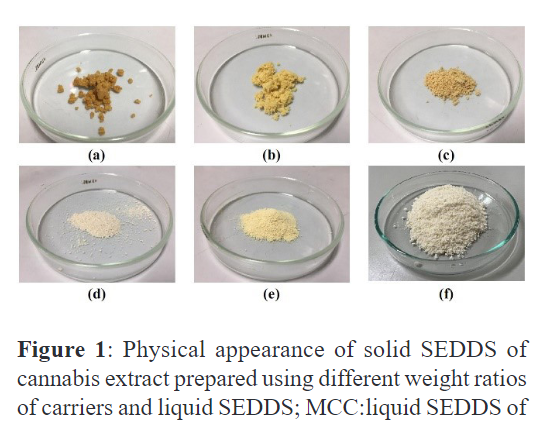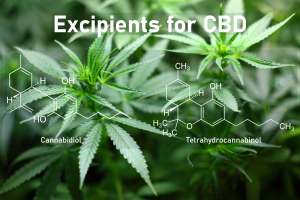Fabrication and Optimization of Directly Compressible Self-Emulsifying Tablets Containing Cannabis Extract Obtained from Supercritical Carbon Dioxide Extraction

Δ9-Tetrahydrocannabinol and cannabidiol, which are present in cannabis extract, exhibit low bioavailability when administered orally due to significant first-pass metabolism. The use of a self-emulsifying drug delivery system (SEDDS) can enhance their dissolution and bioavailability. However, liquid SEDDS formulations are prone to inadequate stability. To address this issue, the development of a solid SEDDS formulation was explored. This study aimed to optimize directly compressible self-emulsifying tablets containing cannabis extract obtained from supercritical carbon dioxide extraction. Initially, a liquid SEDDS of cannabis extract was solidified by adsorption onto solid carriers (colloidal silicon dioxide and microcrystalline cellulose).
The resulting solid mixture was then combined with other pharmaceutical excipients and compressed into tablets. Three factors were optimized using the Box-Behnken design: compressional force (1,000–2,000 psi), quantity of hydroxypropyl methylcellulose (0–6%), and quantity of croscarmellose sodium (0–6%). The results revealed that a mass ratio of colloidal silicon dioxide, microcrystalline cellulose, and liquid SEDDS of cannabis extract at 0.65:2:1 successfully solidified the mixture. The optimal tablet formulation was achieved with a compressional force of 2,000 psi, without the addition of hydroxypropyl methylcellulose or croscarmellose sodium. Verification data indicated that the predictions made by the computer software were accurate and reliable.
The developed tablets exhibited improved dissolution of the cannabis extract, with Δ9-tetrahydrocannabinol demonstrating higher dissolution compared to cannabidiol. Additionally, the compressed tablets were capable of emulsifying small nano-sized droplets (approximately 200 nm). However, the droplets exhibited a larger size and broader polydispersity index compared to the liquid SEDDS. In conclusion, the study successfully developed directly compressible self-emulsifying tablets that enhanced the dissolution of cannabis extract.
Download the full article as PDF here Fabrication and Optimization of Directly Compressible Self-Emulsifying Tablets Containing Cannabis Extract Obtained from Supercritical Carbon Dioxide Extraction
or read it here
Materials
Tween® 80 and Span® 80 were purchased from P. C. Drug Center Co., Ltd., Bangkok, Thailand. Coconut oil was obtained from Thai Pure Coconut Co., Ltd., Samut Sakhon, Thailand. Colloidal silicon dioxide (CSD) (Aerosil® 200) was purchased from P.C. Drug Center, Bangkok, Thailand. Microcrystalline cellulose (MCC) (Comprecel® M102) was purchased from Maxway Co., Ltd., Bangkok, Thailand. Magnesium stearate was gifted from Sun Herb Thai Chinese Manufacturing, Pathum Thani, Thailand. Hydroxypropyl methylcellulose (HPMC) (Methocel® F4M) was purchased from Union Chemical 1986 Co., Ltd., Bangkok, Thailand. Croscarmellose sodium(CCS) was gifted from Onimax Co., Ltd., Bangkok, Thailand. Cannabis was obtained from the Narcotics Suppression Bureau with the permission of the Office of the Narcotics Control Board, Thailand.
Monton, C., Chankana, N., Duangjit, S., Suksaeree, J., Naksuriya, O., Charoenchai, L., & Songsak, T. (2024). Fabrication and Optimization of Directly Compressible Self-Emulsifying Tablets Containing Cannabis Extract Obtained from Supercritical Carbon Dioxide Extraction. Applied Science and Engineering Progress, 17(1), 6973. https://doi.org/10.14416/j.asep.2023.08.004
Read more on The Role of Excipients in CBD Products here:


